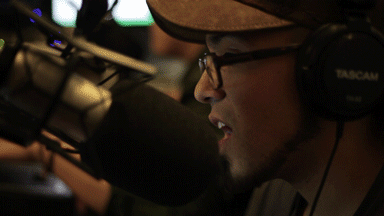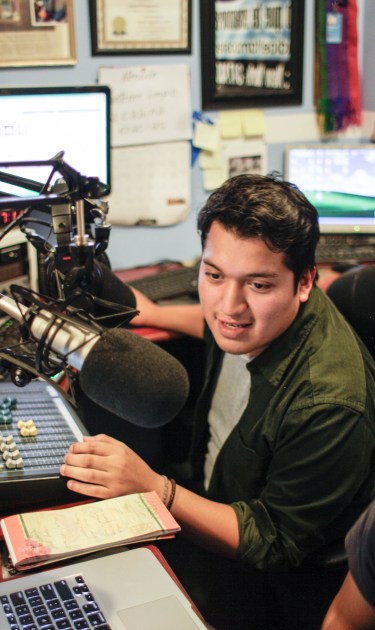Not far from South Bronx corner bodegas, street vendors, and the Yankee Stadium, stands an unremarkable tan apartment building. You wouldn’t know it from the outside, but in its weathered basement, is a radio studio and haven for New York City’s indigenous Ecuadorian Kichwas, a community of an estimated 10,000. In contrast to the Spanish, English, and even Spanglish spoken above ground, the ancestral language Kichwa fills the studio in the form of lyrics, poems, and debates.
Founded in 2014, Kichwa Hatari is the first radio show in the country to broadcast in Kichwa, a regional variant of Quechua and the language of the indigenous Ecuadorian Kichwas. Starting in the 1990s, indigenous communities from Ecuador have migrated to the United States, particularly to New York City and other urban centers, to escape an economic recession back home that has hit indigenous peoples the hardest. But despite their sizable population, Kichwas are often rendered invisible among Ecuadorians and the larger Latino population.
Kichwa Hatari, which translates to “raising Kichwa,” is about regaining visibility and a voice for indigenous Ecuadorians through online media, made for and by Kichwas. Every Friday afternoon, the hosts of Kichwa Hatari — Charlie Uruchima, Segundo Angamarca, Fabian Muenala, and Renzo Moyano — meet underground to discuss indigenous music, culture, language, and world views, as well as the concerns of the local community. Together, the four form a microcosm of the greater Kichwa community, representing different generations, backgrounds, and interests.
“The show is about expressing oneself and not being afraid to do it,” Uruchima explained in an interview.
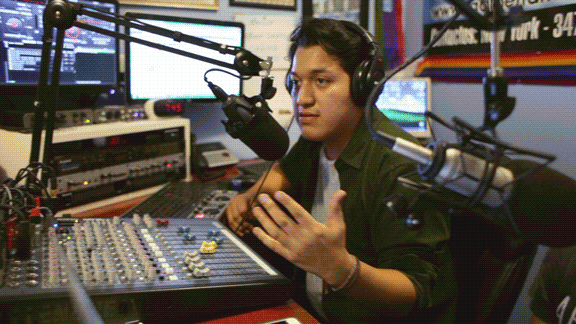
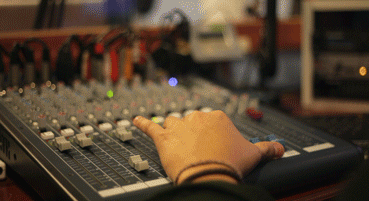
The son of indigenous Ecuadorian immigrants, Uruchima was born in New York City and began to explore his indigenous heritage on his own, later studying Quechua at New York University and connecting to his roots once he immersed himself in the Kichwa-speaking community. In 2014, Uruchima met with Angamarca, the owner of the DIY Ecuadorian station Radio El Tambo Stereo, to formulate a radio show that could at once bring leadership and greater cohesion to the Kichwa community while pushing for cultural empowerment.
But for many Kichwa transplants, expressing or practicing their indigenous identity and values is not always an easy feat. Kichwa immigrants who faced discrimination in their Ecuadorian hometowns may carry the stigma of their identity to the United States and pass it down to the new generations, explained Angamarca, a Kichwa immigrant himself who resettled in the Bronx. In their adopted cities, Kichwas may refuse to speak their native language in public or to wear their traditional dress such as polleras and ponchos. Men may even cut their long hair.
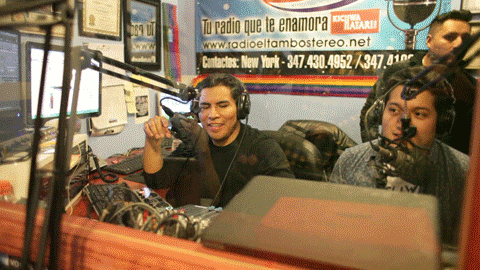
“We’re motivating people with the program,” Angamarca said. “We’ve seen some changes. Many of us were afraid to state whom we are, but now, in the streets, in trains, in restaurants, people are speaking in Kichwa. Women dress in traditional clothes. There’s not that fear anymore.”
Through a mixture of cultural programming, a language learning segment, and offline community activism, Kichwa Hatari helps empower the community culturally, socially, and politically. Because a large part of the community is undocumented, Kichwa Hatari works with local organizations to inform them of their rights as laborers and immigrants. During a spike in ICE raids in January, Kichwa Hatari translated from Spanish to Kichwa circulating documents that prepared undocumented immigrants in the case of a home raid. The radio collective also provides translation in courts, schools, and hospitals.
With their learning language segment, Kichwa Hatari hopes to address an overall decline in Kichwa use that has prompted UNESCO to designate the language as endangered. For immigrants and New York natives alike, the on-air class is an important tool for the language to pass on to indigenous youth. Rosa Cazho, an Ecuadorian native who migrated to the Bronx at the age of 12, didn’t learn Kichwa from her indigenous parents. While she did pick up a few words in her hometown — Cazho calls her grasp of Kichwa a “Kichwa machucado,” she didn’t start to properly study the language until she tuned into Kichwa Hatari.

“I started to listen to the radio, the way everyone talked and valued their culture,” Cazho said. “And I thought, I can’t be left behind.”
Inspired and encouraged by the Kichwa Hatari crew, Cazho now stars in her own three-hour radio show centered on traditional Ecuadorian sounds that she streams on Facebook Live, some live videos garnering more than 10,000 views and 300 comments. Along with her friend Deysi Alvarez Pichizaca, Cazho also writes and acts in comedy skits in both Kichwa and Spanish that draw from her Ecuadorian culture.
“We still don’t know how to value our culture,” said Cazho. “So that’s why I say the more chances we have to reach the community, the better.”
Moyano, the youngest and latest addition to Kichwa Hatari, began to explore his indigenous roots on his own. While his parents are Colombian and Ecuadorian, Moyano explained that they don’t know Kichwa or much about their indigenous roots.
“They never really wanted to learn that much about their indigenous roots and so I wanted to go beyond what my parents contributed for me and my sister growing up,” Moyano said. “So I wanted to not simply know what my mom and dad know, but to go beyond that and know things that they didn’t know and for me to even be able to teach them new concepts that are related to us directly.”
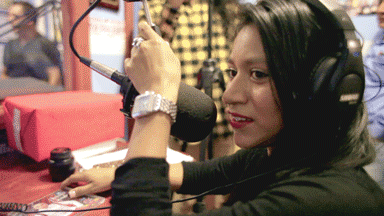
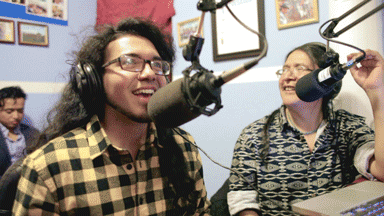
After graduating from Colby College in Maine, Moyano returned to his hometown, New York City, and joined Kichwa Hatari as a host and the in-studio student on the learning language segment of the show. When asked why he decided to learn the language, he explained that the language provides an entryway into the Kichwa worldview, which values community, cooperation, reciprocity, and communion with the natural world.
“Language is not merely a set of grammatical rules, or a list of vocabulary words, but it really is a specific unique human way of understanding the world,” Moyano said.
As an example, Moyano recounted a ritual he witnessed in Ecuador where an elder named all of the most important mountain peaks of the Andes. The elder called the peaks “taitas,” or fathers, Moyano explained.
“In Kichwa-speaking communities, their whole notions of mountains, trees, rivers is just so drastically different from how we see them and that’s why there’s a different word for them in Kichwa,” Moyano said. “The way that it’s seen, abiotic things like water, or minerals, or mountains themselves are highly regarded. And here in New York City that is completely the opposite. That’s not how most New Yorkers see the Hudson River.”
These lessons Moyano incorporates into his own life, his community, and into Kichwa Hatari. All in all, an important lesson as indigenous movements in the Americas fight for clean water and land for everyone.
